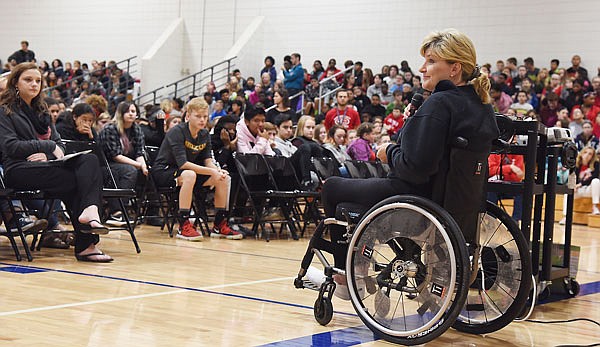Two speakers from ThinkFirst Missouri met with students at Thomas Jefferson Middle School early Monday morning to discuss how choices they make - like whether to wear seat belts - may affect the rest of their lives.
Penny Lorenz-Anderson told the students she had been traveling the state for 30 years, explaining how she came to be a paraplegic.
"We teach and educate students of all ages to use your minds to protect your bodies," Lorenz-Anderson said. "Our whole goal is to teach you the importance of making good choices."
Thursday's assembly kicked off Red Ribbon Week, an annual national effort to mobilize communities to educate youth and encourage participation in drug-prevention activities.
Lorenz-Anderson showed students a photo of the ThinkFirst team who travels around the state. All of the speakers at the organization are survivors of traumatic brain injuries or have had spinal cord injuries.
"Another thing we have in common - all of us were injured because of motor-vehicle crashes," she said. "We were either the new young, newly licensed person who caused the crash, or we were riding with one."
The last thing they have in common is none of them were wearing a seat belt when the crashes happened.
"Don't just think about yourself," Lorenz-Anderson told the students was a message from a mother. "Think about what this would do to your family."
She told the students about Warren Thompson, whose family is from the St. Louis area. He was involved in a crash in which a driver he was riding with was impaired. Thompson was crushed in the car, and his brain injury left him in a coma for three months. When he awoke, he was paralyzed throughout his body and blind. He could not speak.
"An injury as severe as his - we call it 'locked in.' He's locked inside of his own body," Lorenz-Anderson said.
He could hear what people said and understood it, but had no other communication beyond blinking his eyes - once for 'yes' responses or twice for 'no.'
Thompson's family lost everything because people with his injuries require around-the-clock care and they knew nobody would care for him the way family would. Thompson's mother called about a month ago and told Lorenz-Anderson he had died. He'd survived 22 years, with his mother taking care of him every day.
"It's not just you that the outcome can have an effect on with some of those choices," Lorenz-Anderson said.
The leading causes of motor-vehicle crashes, she said, are alcohol or drug impairment, speeding or driving aggressively, and distracted driving.
She reminded students not only that they need to wear seat belts, but that they need to wear them properly.
Chad Burton, another ThinkFirst Missouri speaker, said a traffic accident caused him to have a traumatic brain injury more than 20 years ago.
The accident left him paralyzed on his left side. Burton was a varsity wrestler for Rock Bridge High School in Columbia when he had the traffic accident.
Burton said the passenger sitting beside him wore a seat belt, which he credits with saving two lives - his friend's and his own because the friend was able to run for help.
Burton's injuries left him in a coma for six weeks. Because of his brain swelling, surgeons had to remove part of his skull to relieve pressure. The crash injured the right side of his brain.
He joked that he has no feeling on the left side of his body, so when he eats, he can't feel when food is hanging off the side of his lip.
"It's kind of embarrassing to talk to a hot waitress when there's lettuce hanging on the side of my mouth," he said, "or there's pizza sauce on my forehead."
Burton lost 60 pounds when he was in a coma. He threw himself into therapy. He had to re-train his brain how to work.
He would ask his therapist to help him learn to tie his shoes.
"My therapist was like, 'Chad, don't worry about it; you can wear Velcro shoes,'" Burton said. "I'm not going to be like my 4-year-old brother or my 80-year-old grandfather."
He said a one-armed man sitting in a waiting room for a clinic showed him how to tie his shoes with one hand. Then he demonstrated to the students how he ties his shoes.
"If something like this happens to you, it can be the worst thing in your life," Burton told the students. "There's a 100 percent chance everyone in here is going to be in one car wreck in your life. The average person is in seven.
"Every time you get in a car - whether you're going down to check the mail or you're going to town or you're going to another state - make sure you buckle up."

